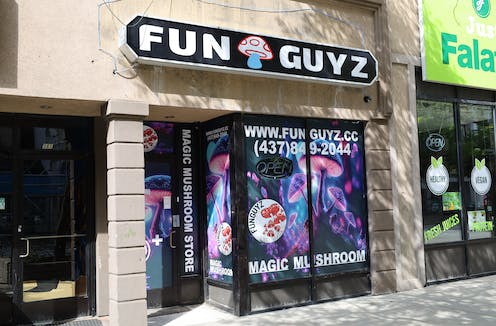
On Nov. 3, police raided three Vancouver magic mushroom dispensaries and seized tens of thousands of dollars worth of psilocybin and other psychedelics.
One store has already re-opened, with the owner saying the other two will reopen soon.
Psychedelics remain predominantly illegal in Canada. But storefronts advertising psychedelics are popping up throughout downtown Toronto and Vancouver. And there are hundreds more Canadian options online.
Table of Contents
Mushrooming trade
As Canada lags on approving therapeutic psilocybin products, the illicit market is flourishing. Operating in a legal grey area, Canadian stores and websites are increasingly selling psilocybin, MDMA, ketamine and more. To date, the government has largely turned a blind eye to these stores.
The Vancouver police had previously expressed that their primary concern is gang-related opioid trafficking, but this appears to be changing, and police have indicated more raids will come.
We have seen this story before: repeated raids on cannabis dispensaries failed to dissuade owners while using up vast police resources.
Yet simply ignoring the growing psychedelics storefronts allows stores to prioritize commercial interests over public health: with no regulations, sellers make wild assertions about their products with no oversight. Age checks — particularly online — are rarely conducted.
Perhaps most egregiously, public-facing marketing is totally unrestricted: while cannabis stores cannot even allow products to be viewable from the outdoors nor make any health claims about their products, psychedelics stores regularly showcase splashy branding and make unsubstantiated claims about psychedelics’ possibilities.
The lack of a regulated supply also impedes shops from making reliable dosing recommendations — those would require full knowledge of the actual ingredients.
An unrealistic medical model
To date, the Canadian government has solely focused on medical use of psychedelics. In June, Canada invested nearly $3 million into researching the benefits of psilocybin-assisted psychotherapy.
For now, the government suggests seeking out clinical trials to anyone interested in using psychedelics.
While the medical model is appealing, it also ignores the realities of psychedelics use in Canada. A recent survey found that less than 34 per cent of Canadians who reported using psychedelics did so to self-medicate a health condition. This means that about two-thirds of those using psychedelics would be unaffected by medical authorization unless able to convince a practitioner that they require the substance.
The recreational and medicinal markets are far more intertwined than many are aware. As so often happens, our denial of medical access has become intertwined with a burgeoning illicit market. We have seen this phenomenon with cannabis and opioids, and it now appears to be happening with psychedelics.
A better way forward
Policy reactions to illegal recreational drugs often fall within two categories: ignore the reality and hope the stores simply disappear; or overreact, executing ineffective and costly raids that do little to dissuade store owners (all while promising medical access that takes far too long to transpire). At present, the government appears to be missing the mark on both ends.
Instead of repeating history, a public-health approach would involve providing objective information about the risks and downsides, banning all marketing and promotion, and encouraging substance testing services. Basic age verification, as with tobacco and alcohol, should be required.
Those interested in purchasing should be provided with third-party, objective information on the health risks and benefits. Customers should, for instance, be made aware that psychedelics have a well-established risk of exacerbating psychotic symptoms. They are therefore highly discouraged for those with psychotic disorders, such as schizophrenic tendencies.
Similarly, customers should understand that Hallucinogen Persisting Perception Disorder (HPPD), often known as “flashbacks,” are a rare but noteworthy condition linked to psychedelics use. There are also real risks during trips of acute increases in anxiety, fear, heart rate and blood pressure.

(Shutterstock)
Notwithstanding, adults should also not face fear-mongering around psychedelics. Research suggests that psilocybin has low physiological toxicity, minimal potential for addiction, and that overdoses are rare.
In short: adults should be trusted to make the right decisions about the non-addictive psychedelic drugs they wish to use. As such, policymakers should ensure that customers do so fully informed about the benefits and risks, conscious of the ingredients in the products, and without commercial pressure.
Psychedelics are an opportunity to do better than our past drug control strategies. Policymakers can avoid fearmongering while preventing commercial interests from running wild. We only have to look back at cannabis to know that our current approach will not be sustainable.
![]()
Daniel Eisenkraft Klein receives funding from the Social Sciences and Humanities Research Council and reports employment with Health Canada’s Tobacco Control Directorate and the University of Toronto.






















